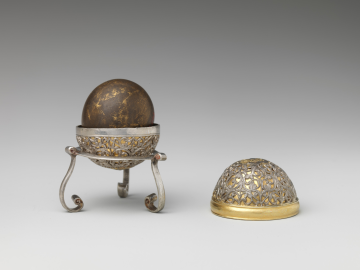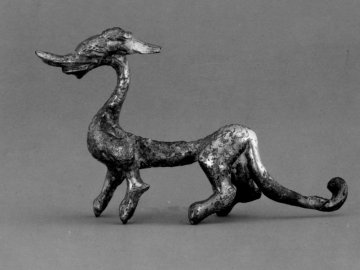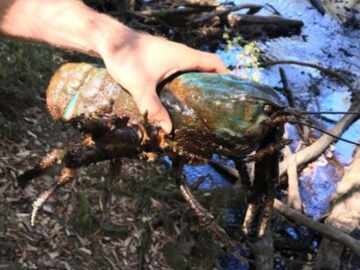Scorch
Aislinn Martin
Summer in Melbourne in the 1980s. It seemed like I was always peeling the back of my legs off sticky seats—the orange plastic chairs at school or the vinyl of the car, where turning on the ‘air-conditioning’ was using two hands to pull down a reluctant window. I spent years of my life in rooms known as ‘portables,’ some of which didn’t even have fans. The slides in the schoolground burned the flesh on the back of my young legs. Razz and cola Sunnyboys from the school canteen came close to fracturing my emerging adult teeth
Summer break was Christmas beetles and the smell of Coppertone sunscreen (protection uncertain, but a step up from coconut oil). I enjoyed this time of the year. Trips to the beach, Christmas presents and ice-cream. The house’s lone air-conditioner rattled away only on the hottest of days and almost never at night. Our parents regaled us with tales of when they were kids and slept on the floor in hallways of old weatherboard houses in regional Victoria and draped wet flannels on their foreheads.
At some point, there was a drought where I grew up. Large cracks appeared in the ground near the creek where we played. The creek itself was reduced to a puddle which could be crossed in a step. Dad put a brick in the toilet cistern to save water, and we soaked the pot plants in my bathwater after I had finished. The garden could only be watered at certain times of the week, according to state restrictions. A dust storm engulfed Melbourne. Luckily some neighbours had pools, and if they weren’t home, we’d visit the local outdoor pool, where an icy pole would barely make it out of the kiosk queue before melting. The sprinkler on the front nature strip was another option, but usually the last resort due to the questionable water pressure and prickly weeds that lodged in the heel of a foot.
*
In 1985, the earth near Geelong was scorched. A bushfire burned, and my grandfather, then in his late 60s, used hessian sacks drenched in water to beat out the flames that were surrounding his farming property. A twist of luck saw the fire zigzag right around the shearing shed, but 10,000 hectares went up around the You Yangs, two people died and thousands of stock were lost. We visited just a few days later. Grandpa turned up at his house in Lara with blackened circles under his eyes after spending several days armed with a wet broom and other implements he’d fashioned to fight the embers. The land was still steaming. The fire started by accident – human error. It was all for nothing.
*
The one thing you could count on was an eventual cool change. After a couple of days of hot weather, clouds formed, the temperature dropped rapidly and some drops of rain appeared. The footpaths lost their sizzle, budgies closed their wings again and washing was hurriedly brought inside. Before we knew it, the summer was over, and the memory of warmth was forgotten as chillblains formed on my toes during winter – a special by-product of sitting at outdoor football games week after week.
Winters in Melbourne seemed interminable as a child. The greyness cast wide shadows as runny noses and coughs circled the schoolyard. Winter now feels short and sharp; the warmer weather is creeping in earlier. Last summer I got a heat rash on my forehead that stayed until mid-autumn, when the permanent film of sweat on my face finally dried. My water tanks were empty before Christmas. I placed towels and sheets over vulnerable garden plants and watered after dark. I brought the budgies’ cage indoors. The indicator stalk in the old car cracked and broke off in my hands. Despite the use of reflective shades, the steering wheel was capable of burning my hands, so I drove with as few fingers as possible until the air-conditioner cooled the cabin down. By January, the upstairs indoor blind had melted off its roller, and I ordered expensive outdoor shutters.
Public transport, always a gamble in Melbourne even in optimal conditions, is even more precarious in the summer heat. There are cancellations due to buckled tracks and delays caused by ill passengers. The air-conditioning inside the carriages struggles to keep up with demand, or stops working altogether. Many trams have nothing – some of the old windows cannot be forced open despite best efforts. The heave of hot bodies pressed against each other causes aggravation. Two men nearly come to blows as one accuses the other of pushing in after our train breaks down and we all clamber for alternative transport. Plans are made to limit the time actually spent outdoors.
Long car trips used to be punctuated by stops at service stations to squeegee off insects that flew onto the windscreen and bumper in droves. Once I could find several small frogs under a rock after the rain, but I have seen only one in recent years, and it was dead. Moths no longer buzz against the back door, seeking light. I haven’t seen Christmas beetles in years.
But insects are critical to food chain survival. The CSIRO notes how insects are essential to plant pollination, waste disposal and pest control. They are worried about the declines “in iconic species such as the Bogong moth, green carpenter bee and Key’s Matchstick Grasshopper.”
*
Heatwaves are no longer guaranteed to end within a couple of days. They can last for weeks and may not be broken by rainfall. Months can pass without any rain at all. Even the hardiest of indigenous plants, like eucalypts and wattle, find these conditions difficult. Forty-seven per cent of Australia’s native vegetation is predicted to be at risk from rising temperatures by 2070. Autumn appears to be an extension of summer and there is less rain. Bushfires can become Megafires. Eyewitness accounts describe Armageddon with fires were so big they created their own weather patterns. In 2009, nearly 430,000 hectares of land burned in Victoria with 173 fatalities. Entire towns were wiped off the map. The 2019-20 bushfire season was equally disastrous. Fires burned in Victoria from late November until early March. More than 300 homes were destroyed and 1.2 million hectares burnt. 170 species including mammals, frogs, reptiles, birds and plants are believed to have been impacted by the infernos.
Bushfires in Australia were once contained to the summer months. They are now possible at any time between October to April. The Climate Council confirms that “climate change is lengthening the bushfire season… the nature of bushfires has changed… scientists expect fire weather will continue to become more frequent and severe without substantial and rapid action to reduce greenhouse gas emissions.” Last summer, rainforest on the Sunshine Coast in Queensland burned due to drought conditions, dry soil and heat. An increase in the number of catastrophic fire danger days is predicted. Weather records are being broken. In January 2019, a town north-west of Adelaide reached 49.5 degrees Celsius, and in outback New South Wales, the overnight temperature remained at nearly 36 degrees. Inland Queensland saw ten consecutive days over 45 degrees during this time. Asphalt roads between two states melted. Emergency animal culls were carried out with wild packs dying of thirst. Bats fell out of trees in far north Queensland, leaving their babies to starve in what should be wet tropical rainforest. Masses of fish died in once-mighty rivers that have been reduced to stagnant trickles, as the sudden temperature changes cause the water’s oxygen levels to drop.
I think about the dried creek bed from my childhood and wonder what happened to all the frogs when their muddy home disappeared.
*
The summer of 2019-2020 was like nothing else. Usually a time for relaxation and enjoyment, I spent New Year’s Eve at home glued to media reports about the town of Mallacoota in eastern Victoria. Footage of the town’s evacuation to the local beach in darkness due to the smoke was a terrifying vision. Images of lives and properties lost along with burnt native animals and livestock was heartbreaking. The suffering was unimaginable. The smoke from the numerous fires burning across the state floated across Melbourne for several weeks. The air quality was so poor I wore a mask during my commute, trying to ease the headache I couldn’t get rid of.
Summer used to be a time that I looked forward to as a child. Now, as an adult, it fills me with dread. I fear what conditions it will bring, what towns will be wiped off the map and how many people and animals will lose their lives. Megafires rely on weather changes to help put them out. But what if that cool change never arrives? My anxiety is quelled somewhat by the knowledge that technology is improving to assist with early fire identification and response. People have shown themselves to be incredibly resilient and continue to generously volunteer their services to firefighting prevention, response and recovery. I look after my modest suburban Melbourne garden full of small trees and native shrubs, monitor the water tank levels and hope for the best.
Feature image via 'Art Collection - The Metropolitan Museum of Art'


